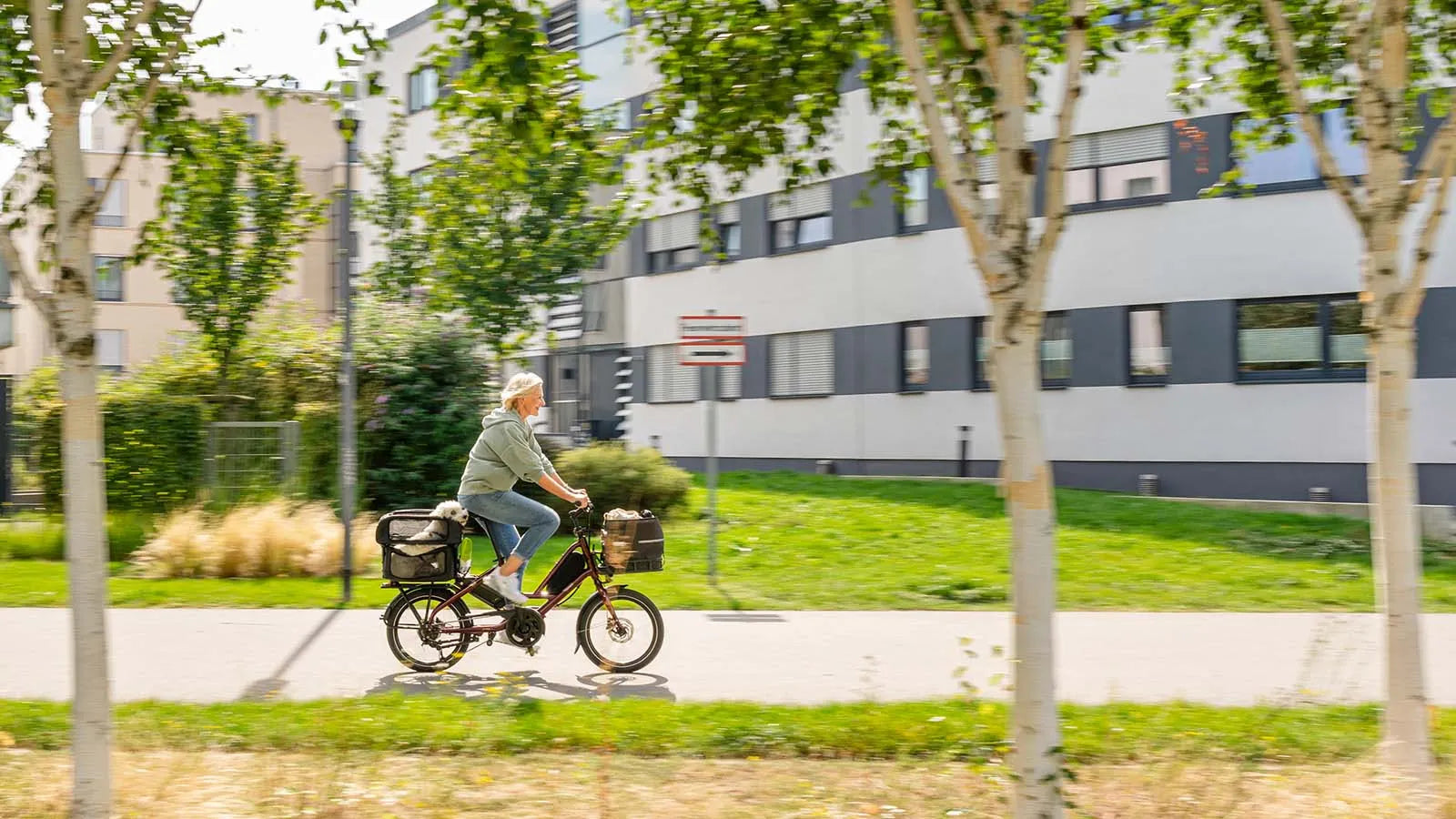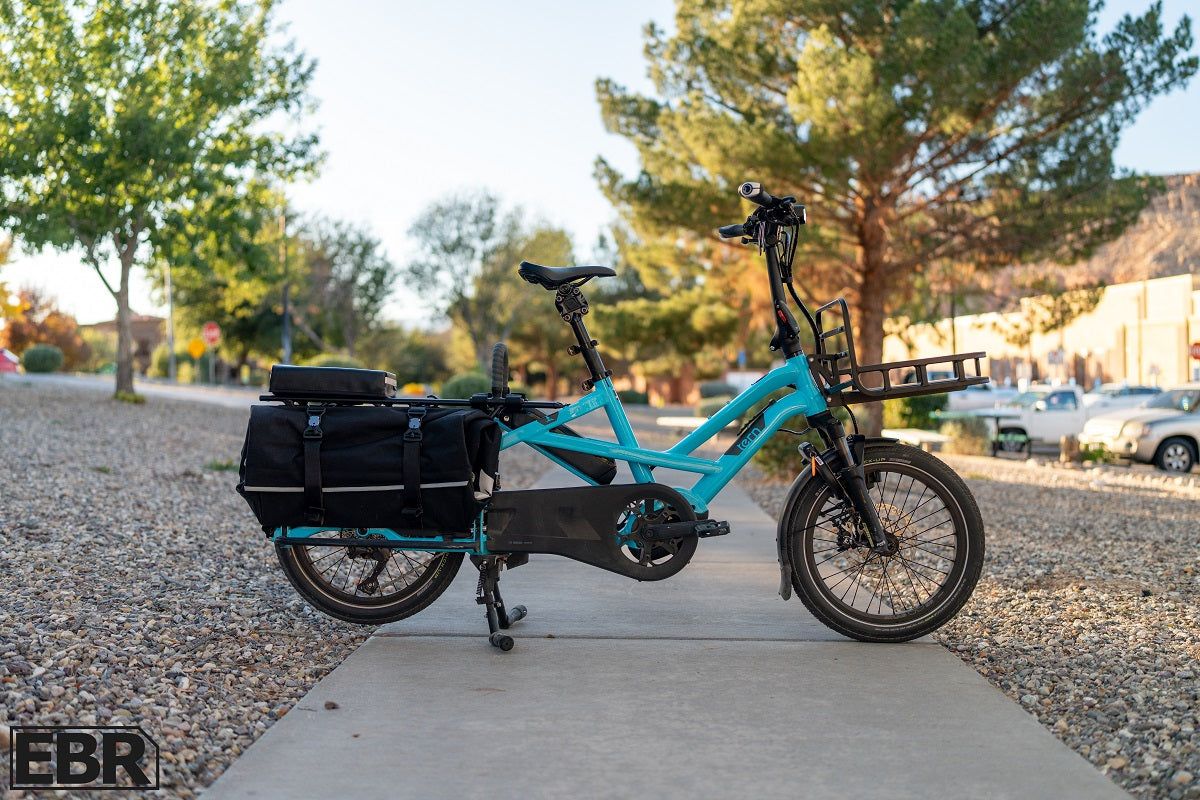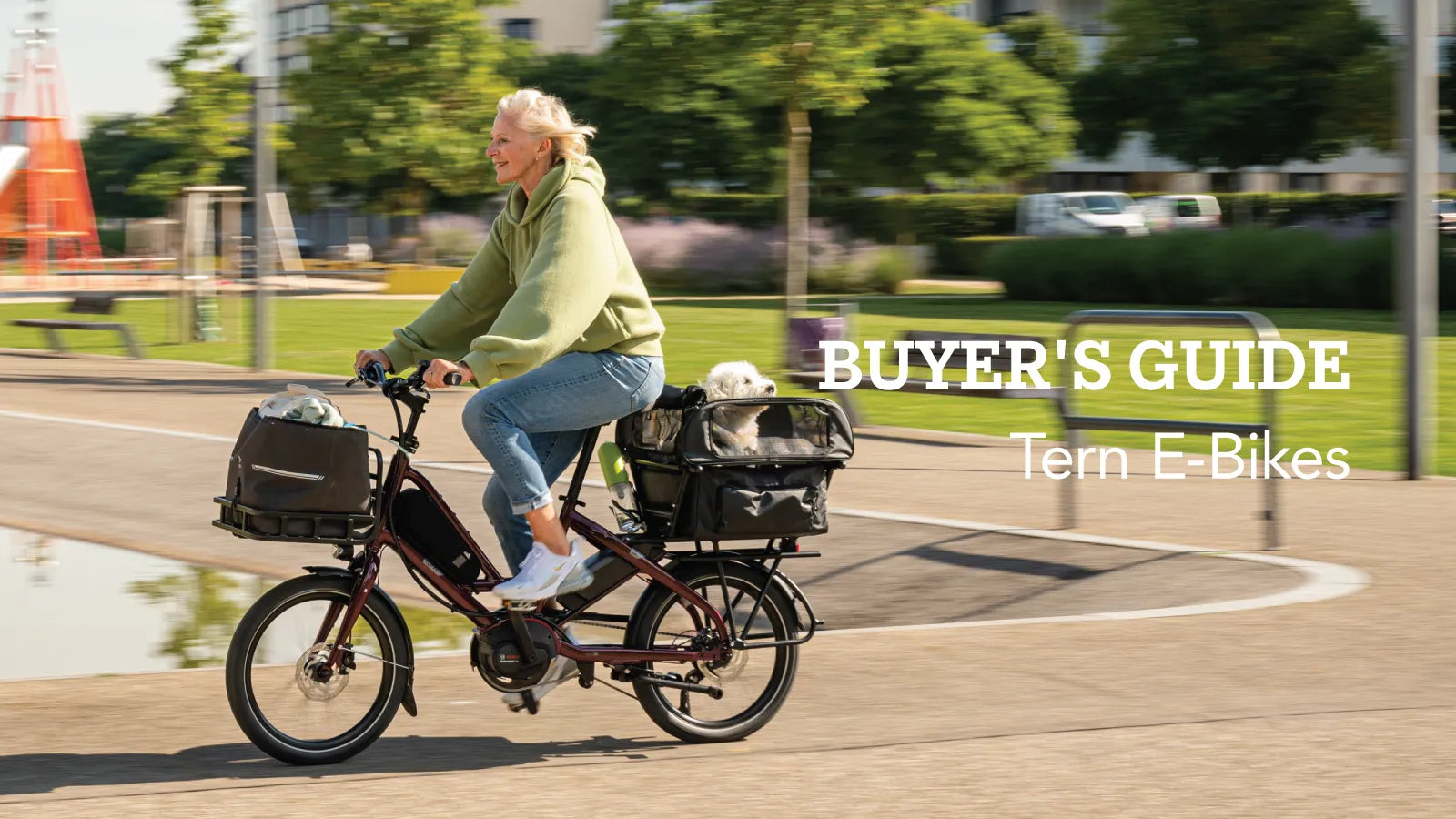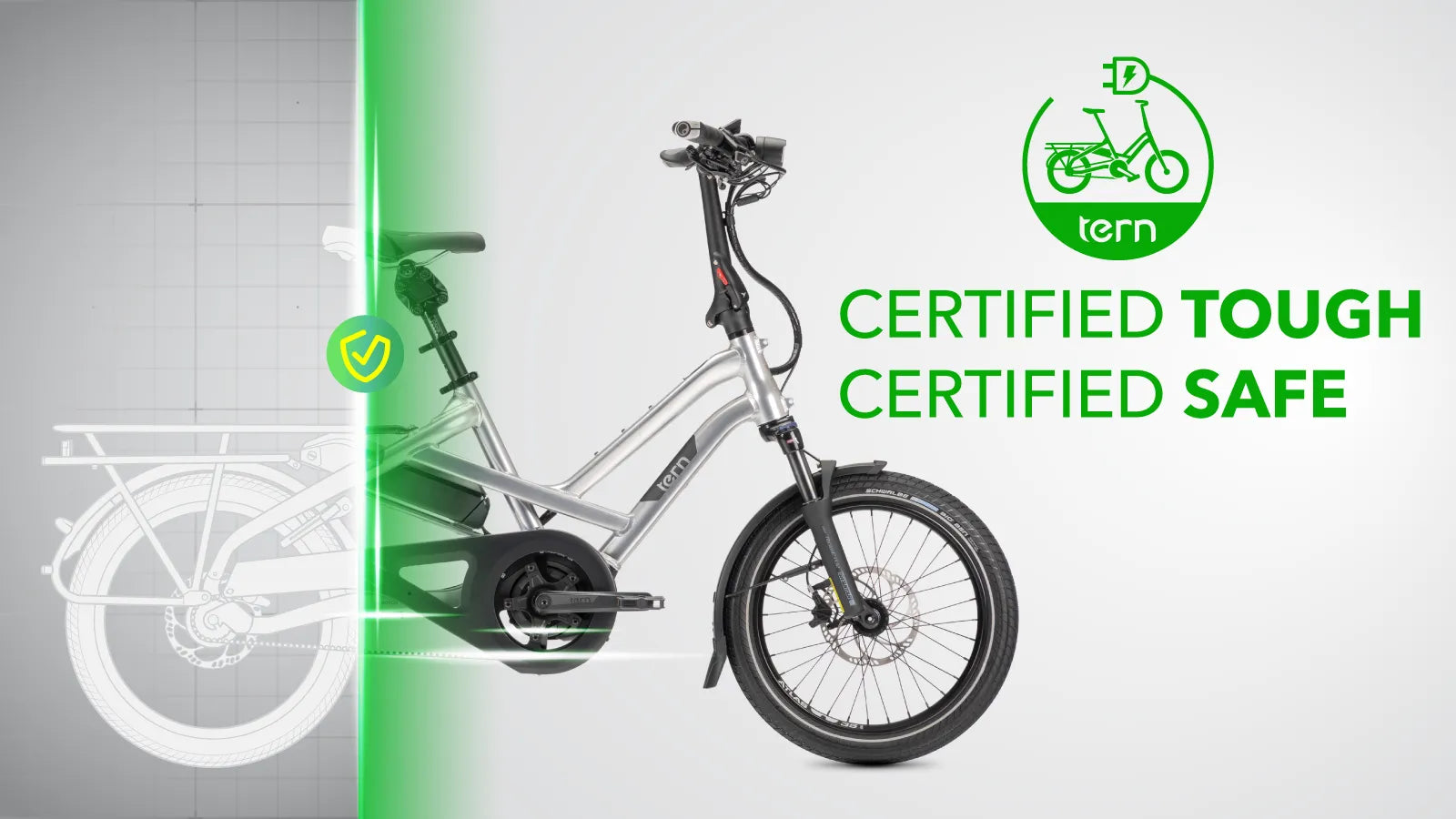
E-Bike Certifications—The Ones That Really Matter for Your Safety
E-bikes have grown in popularity as more people are turning to greener, healthier modes of transportation amidst the worsening climate change. That’s great news—we’re all for reducing society’s reliance on fossil-fuel vehicles and increasing wind-tousled-hair happiness all around!
But not all e-bikes are manufactured to the same standards. Low-quality, untested, and uncertified e-bikes come with hidden dangers, and there’s certainly been no shortage of news reports on fires and safety hazards surrounding such e-bikes in the headlines these days. The US Consumer Product Safety Commission (CPSC) even issued a letter to more than 2,000 manufacturers and importers of e-bikes and other micromobility devices, urging them to review and ensure that they only sell products that comply with relevant safety standards.
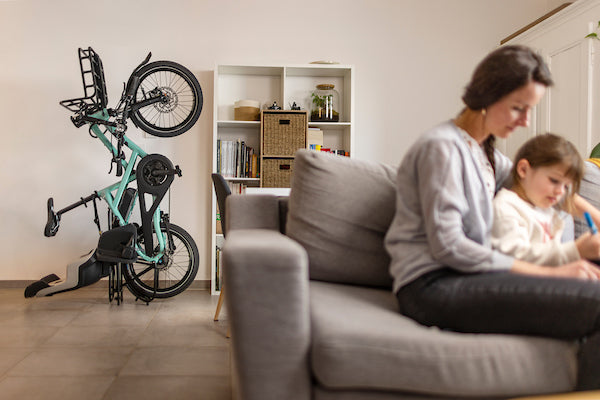
Tern manufactures electrically power-assisted cycles (EPACs), otherwise known as pedal-electric or pedal-assist bikes, or pedelecs. Such bicycles are equipped with functioning pedals, and a motor and battery that supply power to assist the rider's pedaling. Since we believe in offering our riders a fun and worry-free electric bike experience, our e-bikes and e-cargo bikes are designed with safety as priority every step of the way, and are built around high-quality, complete e-bike systems that have been thoroughly tested for electrical and fire safety.
Here’s what current and potential e-bike owners should know about when it comes to standards and certifications related to e-bike safety—which ones cover the electrical system to keep riders away from fire and electrical hazards, and which ones ensure the bike is strong and reliable enough to carry you and your stuff, ride after ride?
Making sense of the alphabet soup
EN, ISO, UL, EFBE. You may have seen them floating around—and we don’t mean the letter-shaped pasta you put in your kid’s soup. Rather, these letter combinations frequently pop up in e-bike related publications. But what are they, and what do they really mean in terms of e-bike safety?

In fact, they are the abbreviated names of collectives or organizations involved in testing, regulating, and/or certifying consumer products like e-bikes: Europäische Norm or European Standards (EN), International Organization for Standardization (ISO), Underwriters Laboratories (UL), and EFBE Prüftechnik GmbH (EFBE). Think of them as gatekeepers that help consumers identify properly made, safe products.
Among the many standards that revolve around the manufacturing of e-bikes, here are the most important ones you should know, as they’re directly related to the rider’s as well as the public’s safety:
ISO 4210
ISO 4210 is a global standard that lays the framework for safety requirements and specifications used for the design, manufacturing, and testing of bicycles, including e-bikes. It covers material strength, essential components like the brakes, wheels, steering system, and frame, as well as testing methods to evaluate safety and performance of bicycles. It’s got an entire section of technical specifications dedicated to e-bikes, which addresses the requirements and testing methods for motors and electrical systems, including chargers.
Although not a mandatory standard, ISO 4210 often serves as the foundation used by individual countries to draft standards for their respective bicycle industries. A bicycle that meets the ISO 4210 standard is considered as being built with high safety standards to protect riders while in use.
EN 15194
EN 15194 is a standard that specifies requirements and test methods for the safety, performance, and design of e-bikes before they are deemed safe for riders and the public. It’s especially developed for regulating e-bikes in European Union countries, and covers common hazards and hazardous events related to e-bikes. In most of Europe, manufacturers are not obligated to comply with EN 15194—the UK and France being exceptions, where compliance with the standard is mandatory.
When an e-bike is indicated as meeting the EN 15194 standard, this means it also meets the standards for mechanical parts set forth in ISO 4210. Furthermore, it has passed comprehensive safety assessments that test and evaluate major areas of the bike including its braking performance, electrical system safety, stability, and durability, making it less at risk of accidents and malfunctions, which in turn promotes rider and road user safety. EN 15194 also ensures that the e-bike meets certain performance criteria to deliver a consistent and reliable riding experience by subjecting the e-bike to testing that evaluates parameters such as power assistance levels, speed limitation, and range estimation.
UL 2849
The UL 2849 standard evaluates the entire e-bike electrical system, including the motor, display unit, cables and wirings, battery, and charger, by testing the said components for fire, electrical, and mechanical safety—alone as well as in combinations with one another. Developed by Underwriters Laboratories, a global leader in safety science that focuses on product safety testing and certification, UL 2849 is a big step up from UL 2271, another standard often referred to by micromobility device manufacturers. The latter solely evaluates components that make up the battery, rather than the entire e-bike system.
Due to its thoroughness in testing all electrical components involved, UL 2849 is considered the gold standard for e-bike system safety. In most markets, bike makers are not required to use e-bike systems that meet the UL 2849 standard, but there’s been an increasing call amid fires caused by lithium batteries of micromobility vehicles to make UL certification compulsory, as seen in New York City’s move to ban uncertified e-bikes.
But wait, there's more
The ISO and EN standards do a fine job of ensuring the safety of traditional and electric single-rider bikes (up to gross vehicle loads of about 120 kg [264 lb]). But since many e-bikes and e-cargo bikes nowadays are designed to carry heavier riders and much heavier loads, additional tests are needed to determine if they can remain safe and reliable under greater stress. Major load-bearing components like the frame and fork need to be massively stronger, brakes need to be more powerful, wheels need to be stronger…you get the picture.
That’s why Tern uses the EFBE Tri-Test.
EFBE Tri-Test
Based in Waltrop, Germany, EFBE Prüftechnik is a leading independent laboratory specializing in the mechanical testing of bicycles and their components. The EFBE Tri-Test is what Tern uses to test bikes for heavier riders and loads.
This custom testing protocol is built upon the comprehensive German standard for cargo bikes, DIN 79010 Cycles - Transportation bikes and cargo bikes, which accounts for usage differences between cargo bikes and city bikes and includes stringent test requirements to ensure cargo bikes remain safe and reliable under heavy load. Developed to simulate the stresses compounded by various loads endured by a bike throughout its entire lifespan, the Tri-Test unleashes a series of grueling fatigue tests, maximum load tests, and overload tests on the component under test.
As an example of how tough the EFBE Tri-Test is, one single frame must pass 10 demanding stress tests using forces proportional to the bike's claimed load. Any damage to the frame caused by one test will carry over to the remaining tests. With each progressive test performed using massively higher loads based on the claimed weight capacity and geometry of the bike, the merciless Tri-Test ensures only the strongest survive. And thanks to this, we end up with bikes that are certified tough for you and your family to depend on.
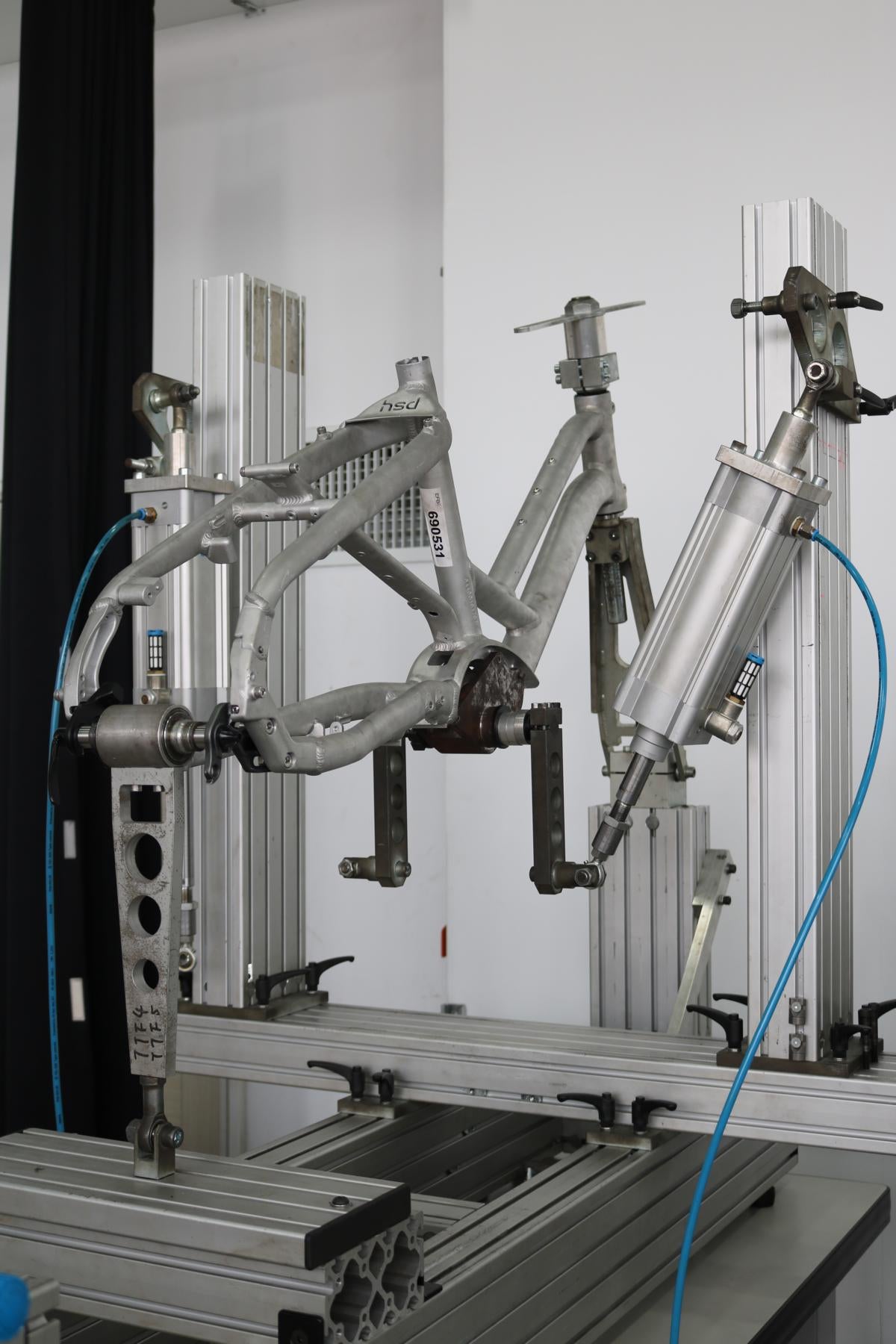
A bike that’s EFBE Tri-Test-approved may not be indestructible, but it’s a much safer alternative when pushed beyond its limits. It’s a voluntary procedure that reputable bike companies turn to if they’re committed to ensuring the safety of riders as well as their passengers and possessions.
Which standards do Tern e-bikes meet?
Before we delve into this topic, it’s important to understand the lingo associated with testing standards. The following is a summary of common terms that are often confused for one another:
- Tested to: A product that is “tested to” a standard means the manufacturer claims it has conducted in-house testing or third party testing (presumably successful) on the product based on an applicable standard, but has not obtained formal certification for the test results. It is considered to be the lowest level of compliance testing.
- Compliant with: A product that is indicated to be “compliant with” a standard means the manufacturer is putting forward a truthful claim that the product fully meets the said standard. Testing for compliance may be conducted in-house by the manufacturer or by an accredited third-party laboratory, and there may be formal certification involved as proof of compliance if it’s the latter.
- Certified to: A product that is “certified to” a standard means that a) an accredited third-party laboratory has tested the product to the said standard and issued a formal certification to that effect, and b) the manufacturer of the product has also undergone periodic auditing to ensure continued compliance for the products they make.Nationally Recognized Testing Laboratory by the Occupational Safety and Health Administration and have UL 2849 listed among its recognized testing standards in order to certify the products it tests for UL 2849 compliance.
- Certified by: A product that is indicated as being “certified by” an accredited third-party laboratory means the manufacturer has tested the product to the applicable standard specifically using the said lab. For example, a battery that has been tested specifically by the UL Solutions lab may bear the words “certified by UL” or “UL-certified”, or the “UL” logo once the manufacturer obtains permission from UL Solutions.
Now that we got the confusing bits out of the way, here’s a list of Tern e-bikes and the standards they meet:
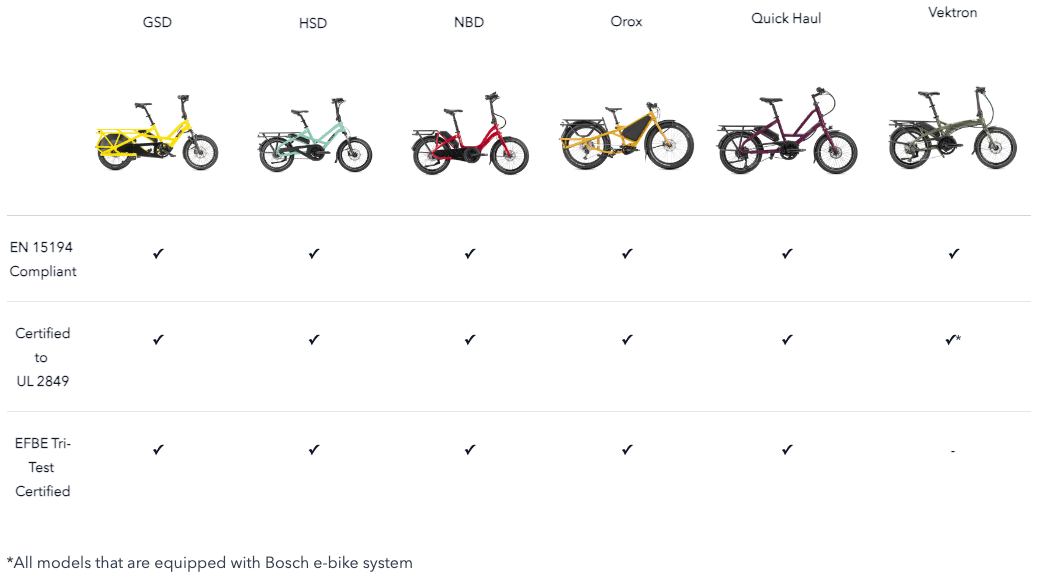
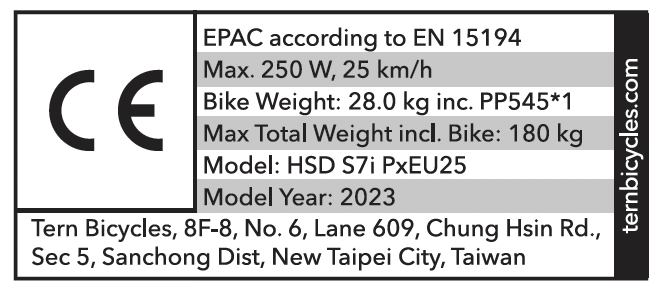
How are certifications indicated on Tern e-bikes?
To help current and potential Terners, Ternips, and Ternites determine if their e-bikes meet the various standards, we provide relevant indications on all our bikes.
Tern bikes sold in the European market have a CE sticker (or equivalent) on the frame that contains information on compliance.
Meanwhile, UL 2849 certification is indicated on the backside of Bosch batteries and chargers, in the form of either the UL or ETL (Intertek) certification mark, depending on the certification lab used by Bosch.
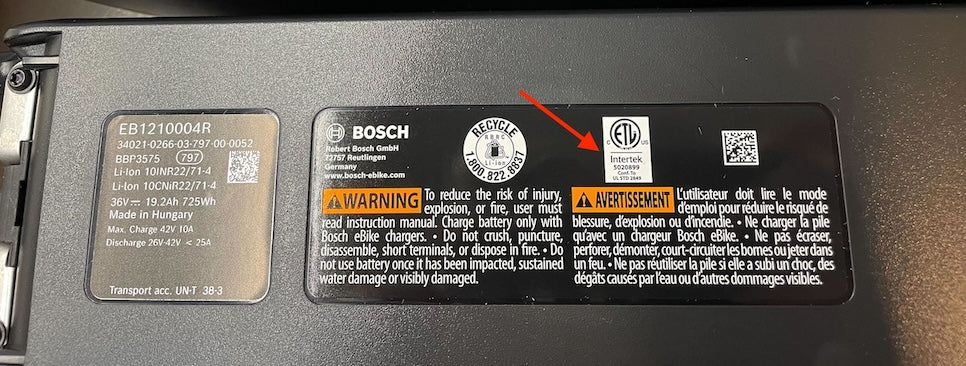
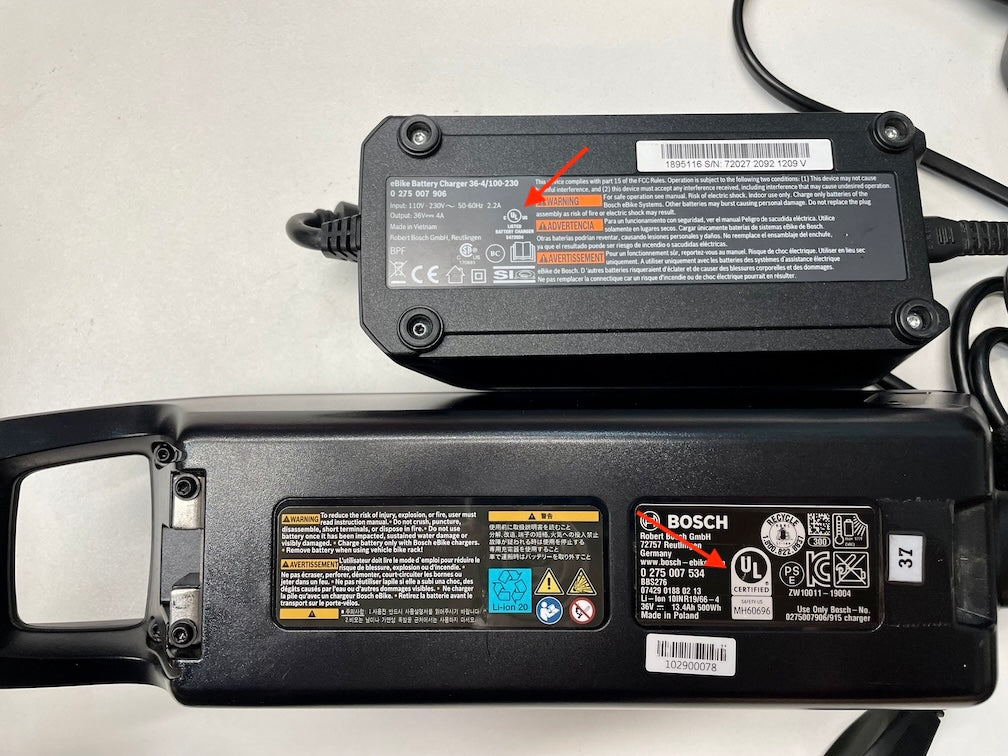

FAQ
- Are Tern e-bikes legal under the Local Law 39 of New York City? Absolutely!
If you’re wondering what this is, the Local Law 39 of New York City prohibits the sale, lease, or rental of e-bikes—along with their batteries—that fail to comply with the UL 2849 standard. But rest assured, Tern e-bike owners of The Big Apple. Your beloved bike is way ahead of the game. Tern e-bikes are equipped with UL 2849-certified Bosch e-bike systems, including the chargers and batteries. - Why are only a handful of e-bikes out there certified?
Getting e-bikes certified by an accredited independent lab means considerable investment needs to be made by the manufacturer. If any part of the e-bike fails testing, it’s usually back to the drawing board to improve the design until you come up with something that’s good enough. The manufacturer itself also needs to be audited periodically, which only adds to the already high cost of getting a product certified. Unfortunately, not all bike manufacturers are willing to invest the time and money it takes to properly certify their e-bikes. Some choose to self-test and issue compliance statements, while others skip this altogether in favor of being able to quickly manufacture cheap e-bikes.
On the other hand, reputable brands go the extra mile to ensure their bikes are as safe as possible for both the rider and the public. - How can I make sure my e-bike and battery remain safe over the years?
Just like any other vehicle, e-bikes need regular maintenance to ensure things are running as smoothly and efficiently as possible. Talk to your authorized Tern dealer to set up a regular maintenance schedule, and make sure you follow it! We also encourage our riders to learn simple maintenance skills you can do at home, such as how to clean and lube your bike chain. Visit our support site to find guides and tutorials you can follow along. If any issues arise in between your maintenance schedule, contact your dealer for assistance.
To care for your battery, follow our battery guide, or visit the official Bosch eBike Battery Guide for the latest information.
- Is my Tern e-bike UL 2849-certified?
We make sure our bikes are as safe as possible before they even hit your Tern dealer’s display. Tern bikes are tested and certified prior to entering the market, so consumers know exactly what they are purchasing and there’s no catching-up to do when it comes to ensuring rider safety.

